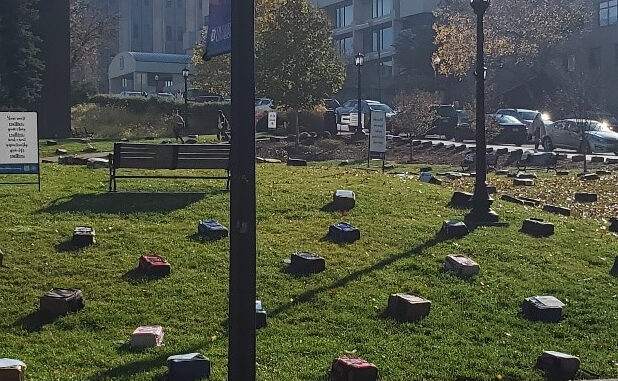
Abbygail Travis | Guest Columnist
Dec. 1, 2022
Backpacks sat ominously across the lawn in front of Fisher Hall during the Active Minds display held on Nov. 3. But these backpacks were not the only baggage accompanying this event.
What wasn’t immediately clear to those passing by was the “Silence Packing” theme connected with the program. Duquesne decided to host an event that centered around severe mental health trauma and awareness, focusing specifically on the concept of grief as it relates to suicide.
Kelsey Pacetti, who helped coordinate the display, said, “The main reaction from students is gratitude.”
Yet, as I explored this claim with other students, as well as professors and teachers’ assistants, I quickly realized that this assertion was not the perspective of the “main” Duquesne population.
These negative experiences, voiced by various spheres of Duquesne, are the stories that were told but not heard. It is time, in my belief, that those stories that fell on unwilling ears and unseeing eyes be acknowledged at the same level as those with only positive remarks to voice.
This installation had a high-risk potential for damaging the mental healing of those who are resolving personal struggles and those who have lost loved ones to suicide. Little sensitivity was shown, as even the trigger warnings were plastered with explicit details of suicide and related information.
Though the event was somewhat centralized in presentation, the explicit and detailed posters, as well as the flyers for the program, could be found scattered over the entire campus for days following the display. Furthermore, even if one was to use the offered alternative route, the display was still incredibly visible, effectively rendering this detour as an inadequate attempt to avoid traumatic topics.
There seemed to be a complete disregard for the accommodations and needs of those with physical disabilities. While there was an inadequately advertised alternative route offered, this identified route was in no way accessible for those who suffer from physical disabilities. This suggested route avoided most of the triggering imagery, but still did not avoid the plastering of traumatic word choice.
Not only was the possibility of avoiding the display insufficient, but the entire detour was both significantly longer than the original path, and had a much more severe slope, rendering this path inaccessible for those who wouldn’t have the energy to go about their day if forced to switch their standard path without forewarning.
How can we, as a university, justify this gross ignorance of the intersectional disparities associated with those who suffer from mental health traumas and who also require disability-related accommodations?
I had to choose between my energy supply for the day or my mental stability.
I would not be able to avoid exhaustion throughout the rest of my classes if I were to use the suggested detour, but I would also struggle to remove my past struggles from my dominating thoughts during my lectures, leaving me mentally absent during class. I, and many other students, professors and assistants were forced to choose between our physical energy and our mental energy extremely early in our day.
How can the authority figures and representatives of Duquesne University justify the advanced warning of a road closure held for a block party at the law school, but pay no mind, nor feel any moral responsibility, to using the same type of notice for this event?
This is the same type of event that will cause some students to identify an alternative route to their classes, and is no more than 100 yards away from the previously mentioned block party example.
How may we, as a student body, justify the lack of compassion and acknowledgement for those who face invisibility in the expression of their stories due to their physical and emotional accommodations, while at the same time promoting our heroic action through our displays of traumatic mental health awareness?
Though the concept of bringing awareness to the struggles endured by those who suffer with mental health strain, the university made a misstep in the hosting, collaborating and preparing of this exhibit. This event illustrates a lack of recognition for those with accommodation on our campus, by not considering all the people who are influenced by the decisions made by those responsible for events such as these.

